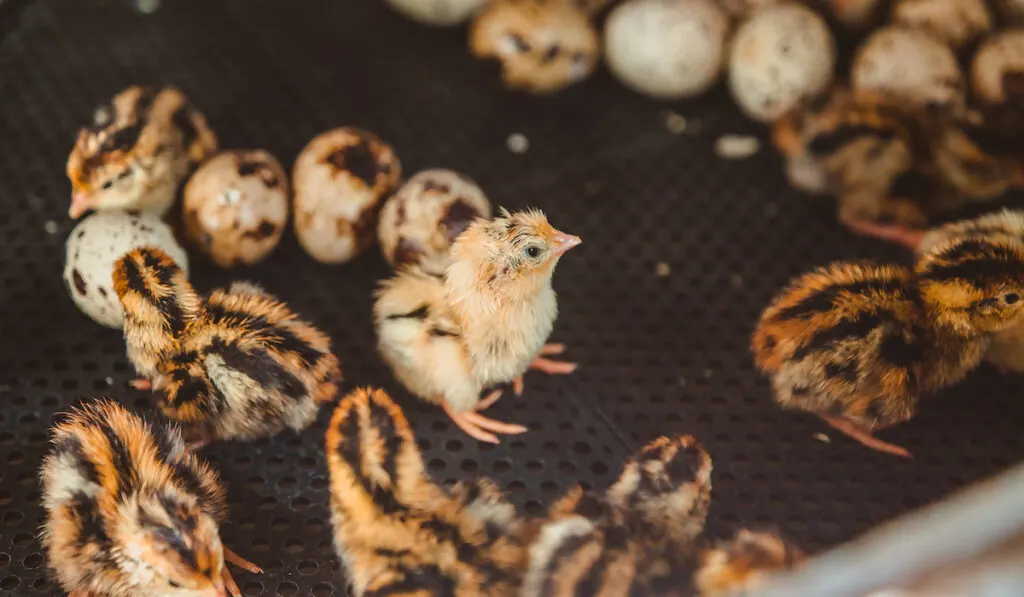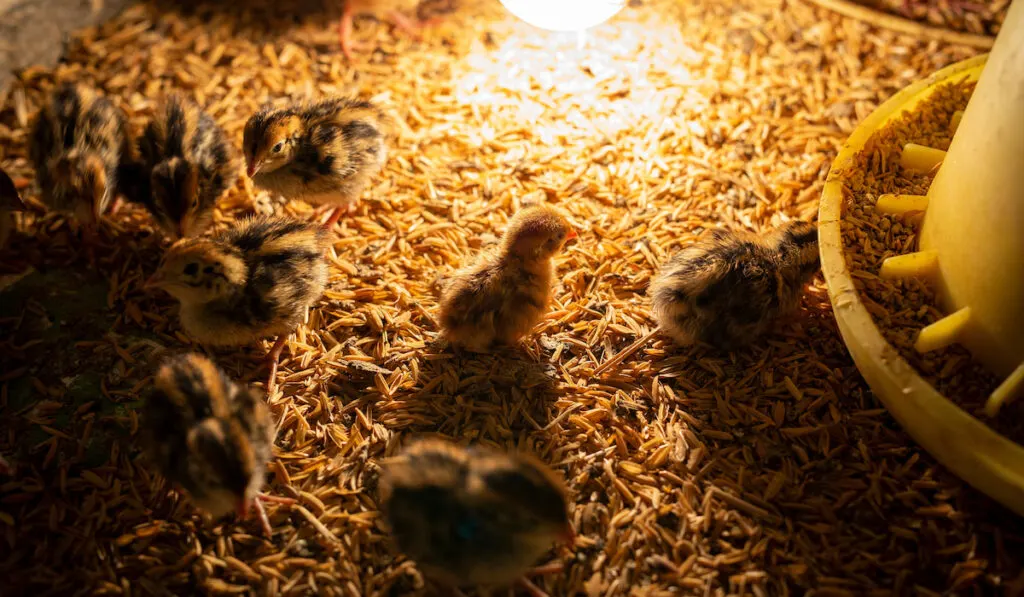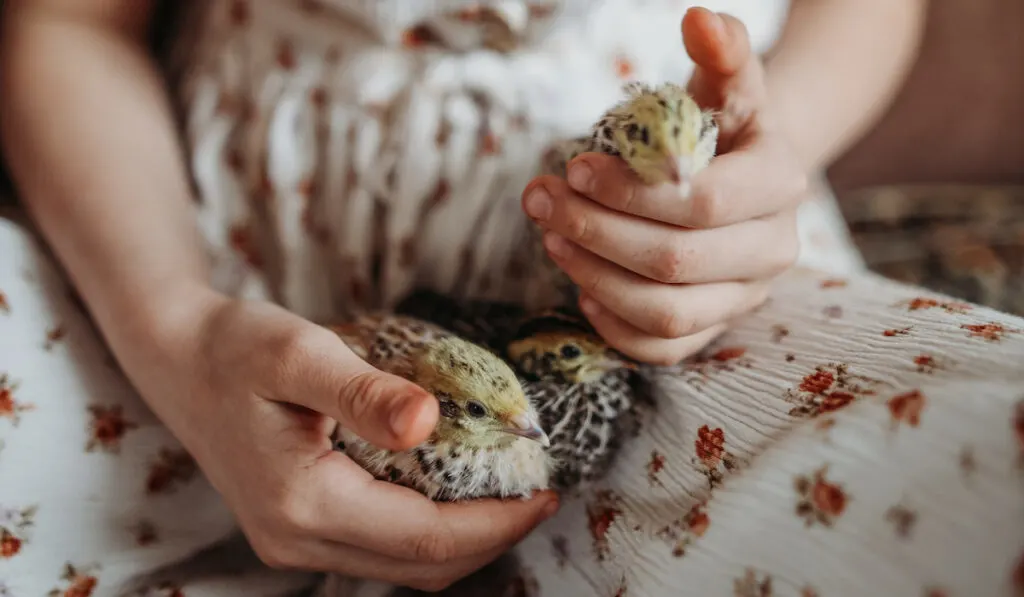Quails offer a lot of benefits to homesteaders, so you definitely should try raising them. But all the information you need to know to raise quails can be kind of overwhelming.
Read this ultimate guide to raise your quail chicks into healthy birds ready for harvest.
Table of Contents
Why You Should Raise Quails
Here are some reasons you should raise quail chicks:
- Meat Production: Though they do not grow as large as chickens, quails produce sweet delicious meat.
- Egg Production: Quail eggs are consumed for their delicacy and other purposes. Some people say quail eggs are medicinal.
- Pest Control: Do you have insects, spiders, nematodes, etc. on your farm? Raising quails is a very cheap solution to that problem.
- They Are Easy and Cheap to Raise: When your quails are matured enough to search for their food, you may not spend a dime to feed them unless you want to.

Best Ways to Raise Quail Chicks
Like every other farm animal, there are two ways to raise quail chicks (some persons choose to buy chicks that are already out of the brooder box).
By Their Mother
Allowing mother quails to raise their chicks saves you a lot of time and money. Mother quails will search for food for their chicks (you can also provide extra feed), protect their chicks, and even warm their chicks when it is cold (make sure that you keep them in a warm spot).
Some people agree that chicks raised by their mother defend themselves better and are more skillful in searching for food (during forage).
By Yourself
If you just started to raise quails, there’s a high chance that you do not have a mother quail to raise the chicks, so you have to raise them yourself.
With proper planning in terms of feed, water, temperature, and shelter, you can raise your quail chicks successfully until they become mature. Here in this article, you will learn everything that you need to raise quail chicks.
Where to Get Quail Chicks
You can get quail eggs from feed mills, breeders, and local homesteaders that raise quails. Make sure that you examine the mother quail to make sure that she is healthy. Also, if you can, you should get adult quails and raise them yourself so that they will lay their eggs under your supervision and care.
Quail Chick Brooder Requirements
The basic requirements to raise quail chicks in a brooder box are:
- Heat source
- Bedding
- Feed
- Water
- Clean Environment
Let us carefully consider each of the requirements.
Source of Heat
Even though birds are warm-blooded, chicks need time to develop into adults that can maintain their own body temperature. To help your quail chicks develop quickly, you need to provide a constant source of heat while they are in their brooder.
The table below shows the needed temperature required by quail chicks according to their age:
| Week | Temperature |
| Week 1 | 95°F (35 °C) |
| Week 2 | 90°F (32 °C) |
| Week 3 | 85°F (29 °C) |
| Week 4 | 80°F (26 °C) |
| Week 5 | 75°F (24 °C) |
As you can see, the temperature need of quail chicks drops by 5°F weekly. This is because as they develop into adults, they can gradually maintain their own temperature and need less external support.
Here are a few ways to keep your quail chicks warm:
1. Install Heat Lamps
The use of heat lamps is the most popular method to keep your quail chicks warm. Remember to always use a heat lamp as well as a thermometer so you can check the temperature in the brooder box.
You can regulate the temperature of the brooder box by regulating the brightness of the heat lamp (if a regulator is available) or by increasing/decreasing the height of the heat lamp.
2. Properly Insulate the Brooder Box and Prevent Drafts
The brooder box should be properly insulated. If not insulated, the brooder box can become cold quickly and you’ll have to spend much more energy to warm your quail chicks. You can insulate the brooder box by wrapping it with a towel, using a spray foam, etc.
3. Know When Your Quail Chicks are Feeling too Hot or Cold
Here’s a cool guide to help you know when your quail chicks are feeling too hot or cold:
- Too cold: If your quail chicks are cold, you will notice them in clusters or very close to the heat lamp. You need to install a new heat lamp or increase the temperature of the brooder.
- Too hot: Your chicks will go far away from the heat source and closer to the walls of the brooder if they are feeling too hot. You should decrease the temperature of the brooder box or reduce the number of heat lamps present.
- Just right: If your quail chicks are at the right temperature, they will be happy and evenly distributed.
Always make sure that the temperature is just right for your quail chicks.

Bedding
Quail chicks need bedding for various purposes. For example, bedding helps absorb moisture from the brooder caused by your quail poop. Bedding also helps the feet of your quail chicks as they need to cling to something when moving.
The best bedding ideas for quail chicks in a brooder box are:
- Paper Towel: Always use a paper towel or any similar material in the first week when raising quail chicks and other birds in the brooder box. Paper towels prevent the quail chicks from eating the bedding and getting sick. After their first week, you can switch to another bedding.
- Wood shavings: Wood shaving is an excellent bedding choice for quail chicks and other birds. You can use pine shavings, but do not use cedarwood as it can be toxic to quail chicks.
- Hay or Straw: Hat and straw are also great bedding choices as they make the bedding floor comfortable for your quail chicks.
Bedding is important for quail chicks. Always use bedding.
Feed
You can feed your quail chicks with a starter feed (made for quails, chickens, or ducks having a crude protein of 24%. When your quail chicks are matured enough (i.e. have left the brooder box), you can feed them with finisher or breeder feed having a crude protein of around 20%.
Here are some examples of food for your quail chicks:
1. Quail-Specific Processed Feed
You should buy quail feed from feed mills. Quail feed has the exact nutrients needed by your quails at their specific age. If you cannot find quail feed, however, you should opt for chicken or duck feed as they provide even more nutrients (especially proteins) for your quails.
2. Seeds and Grains
You can give your quail chicks seeds and grains such as sunflower seeds, wheat, barley, etc. as treats. Quail chicks love their seeds and grains. Remember to feed them with more feeds with higher levels of proteins.
3. Fruits and Vegetables
Quail chicks also love fruits and vegetables. Give fruits and vegetables as occasional treats as fruits and vegetables do not provide the needed proteins for your quail chicks to grow.
Water
You should provide clean water to your quail chicks at all times so they can stay hydrated.
Clean Environment
Your quail chicks need a clean living space. Be sure to change their bedding often and keep their water clean. This will keep bacteria and mold from growing and making your quail chicks sick.

Potential Quail Diseases
Here are some diseases that your quails can get:
- Ulcerative Enteritis: This disease is mostly caused by bacteria in quails with nutrient deficiency, They appear to have an ulcer and also digest food slowly.
- Coryza: This is a respiratory infection caused by bacteria that you quails can get from other quails or their food/drinking sources.
- Marek’s disease: A disease that your quails can get from the herpes virus. It causes tumors and other symptoms in internal organs and can lead to death if not treated.
There are ways to prevent your quails from getting sick. Here are some tips:
- Isolate Sick Birds: When a bird is sick, you should remove it from the brooder or coop immediately until it is well. This will help prevent the transmission of disease from one bird to the other.
- Vaccinate Your Birds: When applicable, you should allow the vet to vaccinate your birds.
- Feed Your Birds with Quality Food: One reason your birds can get sick is when there is nutrient deficiency. To reduce the chances of your birds getting sick, you need to feed your birds with quality feed that has as many nutrients as your birds need.
- Always Provide Clean Water: If you cannot drink the water you are giving to your quail chicks, you should not give that water to your chicks. Water is a major source of infection to quail chicks, so make sure that their water sources are always clean.
- Consult the Vet Regularly: You should always consult the vet and make sure that everything is okay with your quail chicks.
If you use the tips above, your chicks should not get sick.
More Care Tips for Quail Chicks
- Change the Bedding Regularly: You should always change the bedding as unchanged bedding can promote the growth of bacteria. You need to change the bedding every 3-5 days according to the rate at which the bedding soaks moisture.
- Always Clean the Food Trough: You should clean the feeding and water trough of your quail chicks daily to prevent any harmful germs from infecting your quail chicks. Clean the troughs before you give your quail chicks new feed.
- Quail Chicks Should Always Have Access to Food: To help your quail chicks grow quickly into adults, you should give them access to 24 hours of feed. They should always have access to feed so that they can keep eating (even when you aren’t there).
Related Questions and Answers
1. When Should Your Quails Leave the Brooder Box?
Your quails are matured enough to leave the brooder box when the entire surface of their body is covered in feathers. Your quails cannot regulate their temperature without their feathers, so you need to make sure that before a quail chick leaves the brooder box, it has complete feathers.
2. What Do Adult Quails Eat?
When your quails become adults, you will likely feed them with something different. Here are some items that adult quails can eat:
- Free-Range: If you allow your quails to forage for their food, they can eat different items such as seeds, insects, earthworms, etc. It is cost-effective to raise quails in free range.
- Quail Feed: You can always buy quail feed for your quails. Quail feed gives your quails the exact amount of nutrients that they need.
- Grains: Grains are awesome for quails. Quails love their grains, so you want to keep grains as treats so that your quails will continue to value them. You can even feed your quails with grains in the winter as they can get warm while digesting grains.
- Fruits and Vegetables: You can feed your quails with fruits and vegetables. What’s more? They can eat the peels of fruit such as bananas, oranges, etc.
Make sure that your quails have a balanced diet.
3. How Do You Care for Quails in the Winter?
It is easy to care for quails in winter. You should insulate the quail coop and also provide a source of heat for your quails. Make sure that there is always food and water in the coop (even at night) as your quails can generate heat while digesting food. Also, make sure that the coop is draft-free.
4. Why Are Your Quail Chicks Chirping too Loudly?
Quail chicks can chirp for a lot of reasons. For example, quail chicks can chirp when they are excited, scared, feeling too cold, feeling too hot, etc. For you to know the exact reason your quail chicks are chirping too loudly, you will need to observe them closely.
5. Can You Raise Quails With Chickens?
The major challenge people face when raising animals of different species together is the transmission of disease and food. Quails and chickens can eat the same type of food (and processed feed).
With proper care, you can also prevent diseases from transmitting from your quails to your chickens (or vice versa).
It is possible to raise quails and chickens together.
Final Thoughts
Raising quails is easy and fun as quails have a lot of benefits.
Make sure that you give your quails just the right feed they need to grow.
Also, remember to isolate sick quails and raise your quails so that they will grow into healthy adults.
Resources
- https://www.wikihow.com/Raise-Quail
- https://www.thepoultrysite.com/articles/feeding-quail
- https://www.hobbyfarms.com/quail-raising-tips/
- https://www.thehappychickencoop.com/the-ultimate-guide-to-raising-quail/
- https://spadeandfeather.com/blogs/spade-amp-feather/117814597-how-to-raise-quail-chicks
